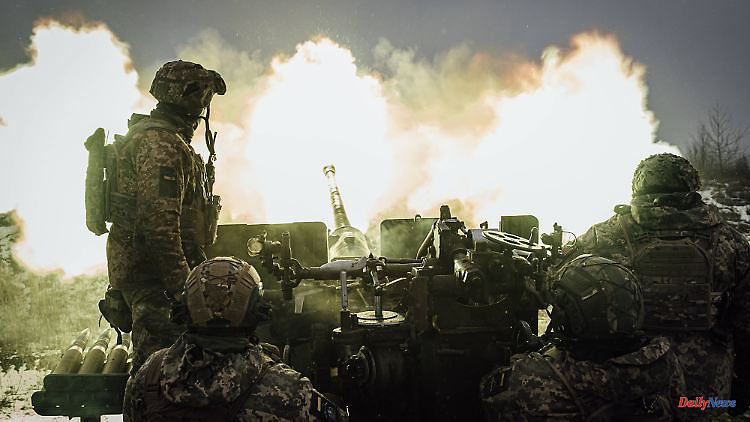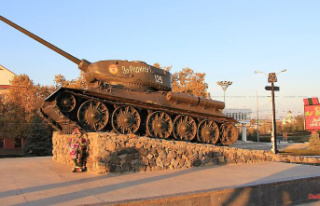Former US General Stephen Twitty was deputy commander of US forces in Europe from 2018 to 2020 and is now closely following the Ukraine war. In an interview with ntv.de, the retired lieutenant general points out the weaknesses of the Russian army and explains the "fog of war".
ntv.de: Mr. Twitty, what has to happen for this war to end as soon as possible?
Stephen Twitty: This war will only end if one of these two things happens. Number 1: There are negotiations that lead to an acceptable result. Number 2: There is a clear winner. Those are the only ways this war will end.
What does a win mean? Should the Ukrainians throw the Russians out of the country completely?
The Ukrainians have the will, they have the courage, they have the audacity. They have everything they need in terms of morale. What they need, of course, is extra firepower. They need F16 fighter jets, they need more tanks, they need more long-range artillery. In this way they would increase their combat effectiveness against weak Russian forces that are unable to carry out large-scale maneuvers. If they get these things, they can be successful.
Some things have already been promised to the Ukrainians, such as armored personnel carriers and battle tanks. Is that enough?
In my opinion they need around 300 tanks to make a difference on the battlefield. We know that the Russians have a lot of tanks, they have a lot of armored personnel carriers and heavily armored equipment. The Ukrainians must be able to do something about it.
Germany and other countries have promised to deliver about 90 Leopard tanks. So you need a lot more.
Yes. But it's not like the tanks just stand around. I can understand that many countries are reluctant to give up their tanks and armored vehicles. We must also consider the security risks of other countries. So it's a huge balancing act between national security and helping Ukraine.
Now, if Ukrainians get the help they need, how soon could the war end?
You never miss a time frame on war. You know, I served five war missions, in the Gulf War, in Afghanistan and in the Iraq War. None of which ended as I expected. This is the fog of war. There are all sorts of factors that can affect war.
The fog of war?
This is how we describe the fact that anything can happen in war. things that cannot be predicted. Take the Russians for example. They are based in Crimea, in the south and in the east. You have to fight a lot to force them out of the country. So this will take a while. I can't tell you how long. This is the fog of war.
Where should Ukrainians set their priorities?
My personal opinion is that they are basically getting it right right now. They are concentrating their forces and conducting minor operations to defeat the Russians. Because they don't have a big army like the Russians. For example, once they sent their forces to Kherson, and then again transferred them to Bakhmut. That's what you do when you have limited powers. You limit yourself to small areas, take a bite of the apple there and then move on for the next bite.
What role does Crimea play?
President Selenskyj has expressed himself clearly. He wants back all the land that Ukraine used to have. This applies both to negotiations and to a continuation of the war. I think the Ukrainians will follow this. Not only Donbass, not only the south, but also Crimea.
What military importance does the peninsula have?
It is not only of military importance, but also of economic importance. There is the Kerch Strait, an important trade route. It's also a perfect launch pad for Russian fire and troop deployments to push further into Ukraine.
If we look at the current situation. Where are we in this war? A Russian offensive is currently expected or may have already begun.
In my view, Russia is incapable of launching large-scale offensives. Last year they tried to take Kiev. In this they have failed completely. Then they tried to advance from Donbass to Kherson. They failed with that too. I do not see that the Russians are now carrying out a large-scale combat maneuver. What I see is more like what we see in Bakhmut. There they fight on smaller, limited areas and try to overcome the opponent with fighting power. They send the soldiers in in waves accompanied by heavy artillery fire.
Is that effective, is that smart?
Absolutely not. What you actually want is to attack with combined arms. That is, foot soldiers in conjunction with armored vehicles, artillery, and fighter planes, all working in concert to create mass on the battlefield. But they don't. They send the soldiers in attack waves. That's why they have such high losses. They use prisoners and conscripts as cannon fodder.
Still, the war seems far from over. And the Russians still have reserves of men and material. Do they still have a chance to win?
I don't want to rule that out. But to date they have not demonstrated the skills needed to win. They neither managed to take Kiev nor to conquer the entire Donbass. They also failed to achieve their strategic goal of creating a land bridge to the Crimea.
But there is a land bridge.
Well, they have a loose land bridge. Cherson was part of their goal of a land bridge. And from there they withdrew. So they don't have a land bridge in the form they actually wanted. Nor have they fully conquered the four provinces they now call Russian.
Nevertheless, one gets the impression that the Ukrainians have big problems. Bachmut could fall, ammunition is running out and the Russians still seem to have large reserves of men and material.
I see it more as a cry for help from the Ukrainians that they need more ammunition, which is true, and they need more armored vehicles and long-range missiles. Bachmut has no strategic importance. Even if Bakhmut falls to the Russians, what good will they do? They would not have achieved a strategic goal by doing so. I'm not sure the city will fall either. It's still going back and forth.
The risk of a nuclear strike feels more real than it has in decades. How do you deal with that?
It definitely feels real. There is always a risk when dealing with a nuclear power. That should worry us, but not discourage us from doing the right thing. That means continuing to help Ukraine so that they can win this battle.
What scenario would you think of? Do we have to worry about an attack on Germany?
I see no real risk for NATO. I rather see the risk of a tactical nuclear bomb being dropped on Ukraine. We want to discourage Russia from even thinking about it. Nobody wins when we talk about the nuclear threat.
Many were surprised at how poorly the Russians acted on the battlefield. How strong do you estimate your reserves? Much seems to be rather old material.
They indeed still have a lot of equipment and people up their sleeves. But we see that the soldiers are poorly trained, poorly managed, and unable to carry out large-scale operations. About 50 percent of their armored equipment was destroyed by the Ukrainians. Or she's in bad shape. I expect that in the future we will continue to see much of what we saw last year: a poorly managed force, soldiers who are not good at fighting, weak equipment that does not offer superior fighting power. I see the same for the future.
As we have learned this year, for a successful attack you need a superiority of 3 to 1. However, the Ukrainians cannot muster that number of soldiers.
That's why we're seeing what we've seen over the past year. Nobody wins in this fight. The Russians have the numbers, but they can't figure them out. That's why we see this back and forth. The balance of power is a disadvantage for Ukraine. Hopefully, having the amounts of gadgets they desire will swing the pendulum in their favor.
If you look at this war. How would you describe him? Some speak of battles like in the First World War.
This war actually reminds me of World War I and World War II. They have trenches, artillery, and little air support. We have two countries here that are simply fighting it out on the ground. With massive casualties on both sides. I've been in the Army for 40 years and I haven't seen casualty rates like this in my five wars. In modern wars, they don't really exist anymore.
Many observers are impressed by the bravery of the Ukrainians and their soldiers. You as a seasoned soldier - what are these men and women going through? What is important?
As someone in the military, I have a deep sympathy for them and take my hat off to their courage and for protecting their homeland and democracy. I can tell you what is important: the comrades to your left and right. They're going through the same hardships as you, but they're a team and on the same mission. There's nothing like comrades to turn to, count on, and have each other's backs. So what are they going through? Many of them are afraid. Now that it's winter, many are cold, their clothes are wet and many are sick. Perhaps some of them had nothing to eat for days. The war leaves traces on the body and the psyche. So these soldiers have been through a lot. And they still have a long way to go because I think this fight will go on for a while.
Volker Petersen spoke with Stephen Twitty












